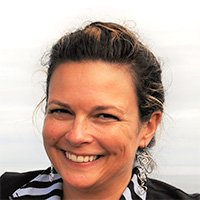Katrine Turgeon
Professor in modeling and aquatic ecology
Affiliations: Center for the Science of Biodiversity of Quebec (CSBQ), Interuniversity Research Group in Limnology (GRIL)

819-595-3900 poste 2909
Research themes
Fisheries, reservoirs and regulated ecosystems, aquatic ecology, socio-ecology, biodiversity, landscape ecology, population ecology, biostatistics
Education
- 2013-2017 : Postdoctoral Research in Aquatic Ecology – McGill University
- 2011-2013 : Postdoctoral Fellowship in Aquatic Ecology – University of Guelph
- 2005-2011 : PhD in Biology – McGill University
- 2001-2004 : Master of Science – Environmental Science – Université du Québec à Trois-Rivières
- 1997-2000 : Bachelor of Science – Biology – Université de Sherbrooke
Description of research
Dans mon laboratoire, nous cherchons à intégrer la complexité socio-écologique dans nos projets de recherche pour une meilleure gestion et conservation de nos écosystèmes aquatiques et de leur biodiversité. Notre recherche est transdisciplinaire et inclusive, utilisant des méthodologies issues des sciences naturelles, des sciences sociales et de l’ingénierie, et engage des collaborateurs issus du monde universitaire, de l’industrie et du gouvernement.
My current research interests are:
- Ecology and food web in reservoirs and regulated aquatic ecosystems
Fragmentation, regulation, and changes in the hydrological regimes of the major rivers caused by dam construction could disrupt the functions, ecosystem services, and biodiversity of these aquatic ecosystems. We adopt a multi-disciplinary approach (meta-analyses, time series analyses, paleolimnology, bioenergetics, and field work) to examine the ecological processes that govern food web dynamics, community structure, and trophic interactions in these “new” ecosystems.
- Socio-ecological complexity in resource management and conservation
For the moment, my work in socio-ecology has focused mainly on fisheries. Theoretical and empirical data suggest that the dynamics of exploited stocks can be destabilized by human behaviour (decisions and behaviour of consumers, fishermen and managers). Surprisingly, little attention has been paid to the uncertainty and risks from these human behaviours on the abundance, stability and biodiversity of fish stocks.
-
add removeKey publications
- Turgeon, K., Turpin, C., & Gregory-Eaves, I. 2018. River impoundments cause little change in littoral fish boreal diversity, but clear species assemblage shifts: A multiscale analysis. Canadian Journal of Fisheries and Aquatic Sciences JIF2018 : 2.631
- Fryxell, J.M., Hilborn, R., Turgeon, K., Carling, B., Caskenette, A., & McCann, K.S. 2017. Supply and demand drive a critical transition to dysfunctional fisheries. Proceedings of the National Academy of Sciences of the United States of America (PNAS) JIF2018 : 9.504
- Turgeon, K., Solomon, C., Nozais, C. & Gregory-Eaves, I. 2016. Do novel ecosystems follow predictable trajectories? Testing the Trophic Surge Hypothesis in reservoirs using fish. Ecosphere 7(12) : e01617
- Turgeon, K. & Kramer, D.L. 2016. Immigration Rates during Population Density Reduction in a Coral Reef Fish. PLoS one 11(6) : e0156417.
- Turgeon, K. & Kramer, D.L. 2012. Compensatory immigration depends on habitat quality and adjacent population size but not on landscape connectivity. Journal of Animal Ecology 81(6) : 1161-1170
-
add removeProjects (coming soon)
-
add removeStudents and postdoctoral fellows (coming soon)
-
add removeAvailable projects
arrow_backBack to Team
